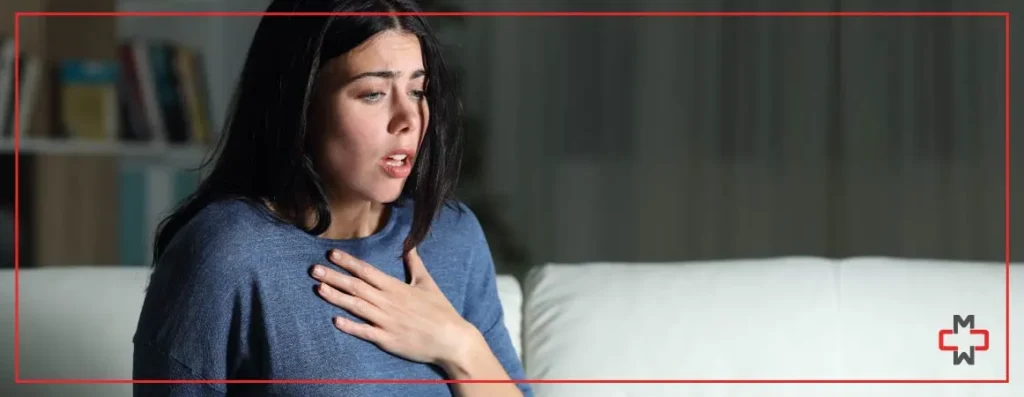Mental illnesses like depression, schizophrenia, and mood disorders harbor a majority of psychiatric diagnoses in the US. But, over 40 million adults – roughly 18.1% of the entire US population – are suffering from a crippling anxiety disorder. Despite being highly manageable and treatable, only 37% of people are timely diagnosed and treated as per the Diagnostic and Statistical Manual of Psychiatric Disorders, 5th Edition (DSM-5).
Your neighborhood anxiety disorder comes to visit in the form of excessive fear, irrational worries, jitteriness, and uneasiness in response to a perceived environmental threat or traumatic event. In addition, your genetics and brain’s biochemistry come together to influence the onset of anxiety during adolescence or early adulthood.
Anxiety affects a person’s functional capacity to perform day-to-day actions. A ‘trigger’ is an inadvertent threat that can stimulate restlessness, fear, and excessive worry in an emotionally vulnerable or mentally ill person. Anxiety does not give a fair warning; you can experience varied symptoms of anxiety by getting exposed to an unknown trigger as well.
Anxiety triggers vary from person to person. For instance, a person who suffers from social anxiety might experience great stress in social situations or being involved in interactions with other people. Similarly, people who have undergone a traumatic experience or lived through an upsetting event might suffer from fear and nervousness when triggered.
Anxiety, however, does not need a specific list of labeled triggers to cause symptoms of distress and discomfort. But, in order to give a fair idea about the most common exposures underlying anxiety, we have discussed four triggers that you might identify on a daily basis.
#1- Caffeinated Beverages
Coffee is a breakfast staple in American culture (thanks to Starbucks), making it quite impossible for the early bird to miss a cup of joe while on the run. Caffeine stimulates the sympathetic nervous system, thus activating the ‘flight or fight response by boosting levels of epinephrine, a hormone in the body.
Limiting your coffee intake to a cup a day from your usual two to three cups might be helpful in preventing a possible anxiety attack. While decaf might not exactly fulfill the reason behind drinking coffee in the first place, it is still a better option if you are looking to maintain your tastebuds.
#2- Negative Emotions or Overthinking
Overthinking is perhaps one of the biggest evils behind an eventful anxiety attack. Self-doubt, intrusive thoughts, negative emotions, and overt criticism can lead to anxiety even in the least susceptible of individuals.
Negative emotions can affect a person’s capability to perceive and rationalize the consequences of a situation. Self-deprecating behavior can result in poor self-esteem and less self-confidence, leading to the negativity that manifests itself through anxiety.
Cognitive Behavioral Therapy (CBT) helps you to identify your negative emotions or feelings so that you can focus on restructuring and reshaping your thought patterns. A CBT-certified therapist or mental health professional might ask you to maintain a journal for identifying your underlying causes of negativity amidst other therapeutic methods.
#3- Changes – Good or Bad?
Any life event – whether positive or negative – can have a lasting impact on a person’s life. Some changes might appear overwhelming and brand new, but eventually, might work out to be for the better. Similarly, there are a lot of unsettling changes in life that might prove to be volatile and temporary, but cause an impact that induces anxiety and fear of uncertainty.
The pandemic served as a bad change in the usual status-quo of the daily hustle-bustle, causing the world’s economy and health to come to a screeching halt. With financial distress being one of the major culprits causing anxiety commonly, there are several milestones in life that can heighten or provoke anxiety in resting individuals.
- Financial Insufficiency is one of the biggest uncertainties of life. It has the capability to steal a night’s worth of sleep (and many more) by making you dwell on negative perspectives of the uncertain future.
- New parents or those planning for a baby might suffer from anxiety due to overwhelming expectations about parenting.
- Conflict in relationships – whether interpersonal or professional – can leave a huge dent in mental peace.
- The fear of speaking before an audience such as in public speaking, stage performances, or work (eg. during a presentation before a boardroom full of people) can trigger social anxiety, fear, and at times, stage fright.
#4- Personal Fears
The thought of interacting with an abuser, a former disgruntled employer, or a fellow veteran is a few examples that might trigger anxiety when exposed to such an environment. A traumatic event can lead to Post–Traumatic Stress Disorder (PTSD), which is characterized by worsening panic attacks and night terrors whenever exposed to an eliciting bad memory.
The Final Takeaway
An anxiety attack can morph into a panic attack, the symptoms of which are categorized by overwhelming uneasiness, breathlessness, and heightened chest pain. Anxiety, however, is also a common side effect of medications—for instance, weight loss medications containing thyroxine—which is alleviated upon discontinuation of the eliciting drug.
Anxiety is not a hopeless cause; going to a therapist or mental health professional might seem daunting at first, but talking about your anxiety triggers might help you to overcome any debilitating symptoms of distress.
Book an appointment with our experts at Manhattan Medical Arts and talk to a licensed mental health professional about your anxiety symptoms today. Together, we can battle mental illnesses and help you cope with anxiety for a better, progressive, and hopeful tomorrow.
– Disclaimer –
This blog is for informational & educational purposes only, and does not intend to substitute any professional medical advice or consultation. For any health related concerns, please consult with your physician, or call 911.
-
About The Author
Dr. Syra Hanif M.D.Board Certified Primary Care Physician
Dr. Syra Hanif is a board-certified Primary Care Physician (PCP) dedicated to providing compassionate, patient-centered healthcare.
Read More







